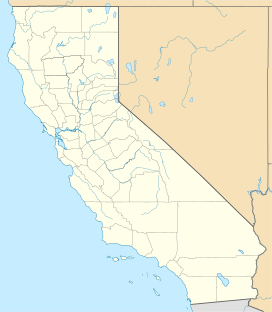Black Mountain Grove (Southern California) facts for kids
Quick facts for kids Black Mountain Grove |
|
|---|---|
| Geography | |
| Location | Riverside County, California, United States |
| Coordinates | 33°49′33″N 116°45′58″W / 33.8258844°N 116.7659807°W |
| Elevation | 6,680–7,336 ft (2,036–2,236 m) |
| Administration | |
| Established | 1974 |
| Ecology | |
| Dominant tree species | Sequoiadendron giganteum (giant sequoia) |
| Lesser flora | Incense cedar, Jeffery pine |
Black Mountain Grove is a special place in Riverside County, California. It's home to more than 150 young giant sequoia trees. These amazing trees grow in a ravine on the side of Black Mountain. This mountain is a smaller peak of the San Jacinto Mountains.
How Black Mountain Grove Started
In 1974, a big fire called the Soboba Fire swept through the area. After the fire, the land was left mostly empty. The United States Forest Service decided to plant small giant sequoia trees, called saplings, in the San Jacinto Mountains of Southern California.
For many years, these trees grew quietly. Then, in 2008, a botanist named Rudolf Schmid and his daughter Mena Schmidt were hiking. They were on the Black Mountain Trail and found these giant sequoias! It was a big discovery.
Today, Black Mountain Grove has over 150 giant sequoias. Some of these trees are already more than 6.1 m (20 ft) (20 feet) tall.
It was later found that the US Forest Service had planted giant sequoias in other parts of Southern California too. However, the trees in Black Mountain Grove and a nearby place called Lake Fulmor Grove are special. They are the only ones known to be growing and spreading on their own, without people helping them.
Nature in the Grove
The weather and land in the San Jacinto Mountains are very similar to the Sierra Nevada mountains. This is important because giant sequoias naturally grow in the Sierra Nevada. Because the conditions are so similar, the trees in Black Mountain Grove can grow and spread naturally throughout the canyon.
Black Mountain Grove has many young giant sequoias and Jeffery pine trees. Before the Soboba Fire, this area had mostly white fir and sugar pine trees at higher elevations. Now, the giant sequoias and Jeffery pines have largely taken their place.
At lower elevations, there used to be many incense cedar trees. These trees have grown back since the fire. Now, they grow alongside the giant sequoias at the southern end of the grove.
How to Visit Black Mountain Grove
Visiting Black Mountain Grove requires a good hike. You have two main ways to get there:
- You can hike about 2.5 mi (4.0 km) (4 kilometers) up the Black Mountain Trail. This trail starts from a marked spot just off State Route 243. This hike is quite challenging.
- You can also hike down from Boulder Basin Campground. This campground is near the top of Black Mountain. This hike is shorter but also very challenging.
 | Shirley Ann Jackson |
 | Garett Morgan |
 | J. Ernest Wilkins Jr. |
 | Elijah McCoy |


